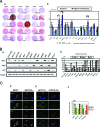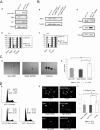Regulation of Skp2-p27 axis by the Cdh1/anaphase-promoting complex pathway in colorectal tumorigenesis
- PMID: 18535175
- PMCID: PMC2438299
- DOI: 10.2353/ajpath.2008.070957
Regulation of Skp2-p27 axis by the Cdh1/anaphase-promoting complex pathway in colorectal tumorigenesis
Abstract
Abrogated entry into S phase is a common hallmark of cancer cells. Skp2, a subunit of ubiquitin ligase, is critical for regulating the G(1)/S transition. Uncontrolled Skp2 activity is detected frequently in human tumors, often correlated with poor prognosis. Current studies have suggested that the regulation of Skp2 turnover is mediated by another critical ubiquitin ligase, the anaphase-promoting complex (APC), in association with its substrate-specific factor Cdh1. To dissect the potential role of Cdh1/APC in tumorigenesis through the degradation of Skp2, we analyzed the Cdh1/APC-Skp2-p27 axis in colorectal tumorigenesis using a human tumor array and biochemical analyses. Our results show that the percentage of Cdh1- and p27-positive samples in colon cancer tissues was significantly lower than that in adjacent nonmalignant tissue. Conversely, the percentage of Skp2-positive colon cancer samples was significantly higher than that in normal tissue. Furthermore, results from clinicopathological analysis revealed that elevated Cdh1 expression was associated with lower histological grade tumors. In addition, depletion of Cdh1 by RNA interference in nonmalignant colon cells resulted in increased cellular proliferation, whereas knockdown of Skp2 significantly suppressed cancer cell growth. Our result suggests a pathological correlation between Skp2 and Cdh1/APC in colorectal cancer. Thus, Cdh1 may function as a component in tumor suppression via proteolysis of Skp2 in colorectal tumorigenesis and may serve as a prognostic marker in colon cancer patients.
Figures






Similar articles
-
Dissection of the APCCdh1-Skp2 cascade in breast cancer.Clin Cancer Res. 2008 Apr 1;14(7):1966-75. doi: 10.1158/1078-0432.CCR-07-1585. Clin Cancer Res. 2008. PMID: 18381934
-
Control of the SCF(Skp2-Cks1) ubiquitin ligase by the APC/C(Cdh1) ubiquitin ligase.Nature. 2004 Mar 11;428(6979):190-3. doi: 10.1038/nature02330. Nature. 2004. PMID: 15014502
-
An in vivo study of Cdh1/APC in breast cancer formation.Int J Cancer. 2009 Aug 15;125(4):826-36. doi: 10.1002/ijc.24399. Int J Cancer. 2009. PMID: 19350629 Free PMC article.
-
Don't skip the G1 phase: how APC/CCdh1 keeps SCFSKP2 in check.Cell Cycle. 2004 Jul;3(7):850-2. Epub 2004 Jul 14. Cell Cycle. 2004. PMID: 15190201 Review.
-
The role of Skp2 and its substrate CDKN1B (p27) in colorectal cancer.J Gastrointestin Liver Dis. 2015 Jun;24(2):225-34. doi: 10.15403/jgld.2014.1121.242.skp2. J Gastrointestin Liver Dis. 2015. PMID: 26114183 Review.
Cited by
-
In silico analysis of a Skp1 protein homolog from the human pathogen E. histolytica.J Parasit Dis. 2022 Dec;46(4):998-1010. doi: 10.1007/s12639-022-01523-0. Epub 2022 Jul 23. J Parasit Dis. 2022. PMID: 36457763 Free PMC article.
-
Insights into APC/C: from cellular function to diseases and therapeutics.Cell Div. 2016 Jul 13;11:9. doi: 10.1186/s13008-016-0021-6. eCollection 2016. Cell Div. 2016. PMID: 27418942 Free PMC article. Review.
-
AurkA nuclear localization is promoted by TPX2 and counteracted by protein degradation.Life Sci Alliance. 2023 Feb 16;6(5):e202201726. doi: 10.26508/lsa.202201726. Print 2023 May. Life Sci Alliance. 2023. PMID: 36797043 Free PMC article.
-
The APC/C E3 Ligase Complex Activator FZR1 Restricts BRAF Oncogenic Function.Cancer Discov. 2017 Apr;7(4):424-441. doi: 10.1158/2159-8290.CD-16-0647. Epub 2017 Feb 7. Cancer Discov. 2017. PMID: 28174173 Free PMC article.
-
The emerging role of APC/CCdh1 in controlling differentiation, genomic stability and tumor suppression.Oncogene. 2010 Jan 7;29(1):1-10. doi: 10.1038/onc.2009.325. Epub 2009 Oct 12. Oncogene. 2010. PMID: 19826416 Free PMC article. Review.
References
-
- Winston JT, Strack P, Beer-Romero P, Chu CY, Elledge SJ, Harper JW. The SCFbeta-TRCP-ubiquitin ligase complex associates specifically with phosphorylated destruction motifs in IkappaBalpha and beta-catenin and stimulates IkappaBalpha ubiquitination in vitro. Genes Dev. 1999;13:270–283. - PMC - PubMed
-
- Sutterlüty H, Chatelain E, Marti A, Wirbelauer C, Senften M, Muller U, Krek W. p45SKP2 promotes p27Kip1 degradation and induces S phase in quiescent cells. Nat Cell Biol. 1999;1:207–214. - PubMed
-
- Carrano AC, Eytan E, Hershko A, Pagano M. SKP2 is required for ubiquitin-mediated degradation of the CDK inhibitor p27. Nat Cell Biol. 1999;1:193–199. - PubMed
-
- Imaki H, Nakayama K, Delehouzee S, Handa H, Kitagawa M, Kamura T, Nakayama KI. Cell cycle-dependent regulation of the Skp2 promoter by GA-binding protein. Cancer Res. 2003;63:4607–4613. - PubMed
-
- Wei W, Ayad NG, Wan Y, Zhang GJ, Kirschner MW, Kaelin WG., Jr Degradation of the SCF component Skp2 in cell-cycle phase G1 by the anaphase-promoting complex. Nature. 2004;428:194–198. - PubMed
Publication types
MeSH terms
Substances
Grants and funding
LinkOut - more resources
Full Text Sources
Medical
Miscellaneous

